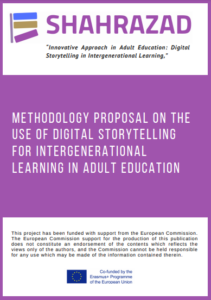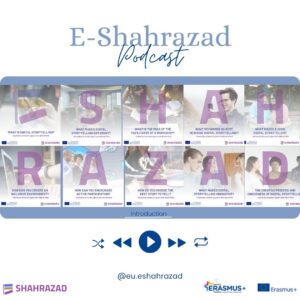E-LIBRARY
E-Shahrazad Methodology Proposal!

We explored the learning needs of younger and older participants and the competences and skills that educators should have in order to organise digital storytelling training in an intergenerational learning setting through:
Literature review made by project partners concerning the intergenerational learning (IGL) approach and digital storytelling (Chapter 1)
Open discussion between partners and digital storytelling experts from Loughborough University (Chapter 2)
Focus group interviews conducted with educators — experts in teaching older adults and/or younger people and/or working within intergenerational learning settings (Chapter 3) and also with students aged 13-25 and over 55 years old (Chapter 4).
Academic point of view on Digital Storytelling in Intergenerational Learning (Chapter 5)
The focus group made up of young and senior students allowed us to understand how to organize intergenerational learning (IGL) and digital storytelling’s methodology, starting with the students as main actors of this process.
As a result of the interviews (Chapter 3 and 4), it emerged that narrative, using song lyrics, retelling experiences and emotions, and narration with drawing and games, are all methods that allow them to involve students and create a trusting relationship between the tutors and their students. Narrative helps create a welcoming environment based on trust that fosters mutual listening. Nonetheless, traditional storytelling is preferred to digital storytelling because it comprises better body communication and gestures, and because participants (mostly the senior ones) favour more traditional tools. Digital storytelling use in IGL setting is still underestimated.
A possible Methodology of Digital Storytelling in Intergenerational learning has been proposed (Chapter 5). It was considered that IGL digital storytelling is a methodological way for the co-evolution of the contents proposed by individual narrations and product cooperation: it becomes a new intangible and collective heritage.
The data in this report will serve as a base for the educational resources that will be developed in further phases of the project “E-SHAHRAZAD. Innovative Approach in Adult Education: Digital Storytelling in Intergenerational Learning”.
IO1 Methodology Report_Eshahrazad
E-Shahrazad Podcast Series!

Episode 0. Introduction
Episode 1. What is Digital Storytelling?
Episode 2. What is the Difference between Digital Storytelling and Other Methods?
Episode 3. What is the Role of Facilitator?
Episode 4. What are the Best Keywords to Describe Digital Storytelling?
Episode 5. What Makes a Good Digital Storyteller?
Episode 6. How Can You Create an Inclusive Environment?
Episode 7. How Can You Encourage Active Participation?
Episode 8. How Do You Choose the Best Story to Tell?
Episode 9. What Makes Digital Storytelling Innovative?
Episode 10. The Creative Process and Uniqueness of Digital Storytelling


